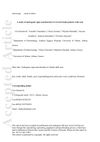Recent Approaches in the Treatment of Polycystic Ovary Syndrome: An Update
March 2022

TLDR There are many ways to treat Polycystic Ovary Syndrome, including lifestyle changes, surgery, and various medications, but more research is needed for better treatments.
Polycystic Ovary Syndrome (PCOS) is a prevalent endocrine disorder in women, leading to various physical and mental health complications. The document reviews several treatment options for PCOS, including lifestyle changes, bariatric surgery, and therapies for anovulation, insulin resistance, menstrual dysfunction, and hyperandrogenism-related symptoms. Medications like Clomiphene, Tamoxifen, Letrozole, and Metformin are used to stimulate ovulation and improve insulin resistance. Oral contraceptives are commonly used to manage menstrual irregularities and hyperandrogenism symptoms such as hirsutism, acne, and alopecia. Natural products like Inositol, vitamins, omega-3 fatty acids, and certain herbal plants have shown potential benefits in treating PCOS symptoms. However, more research is needed to understand the pathophysiology and genetics of PCOS and to develop specific treatments.





